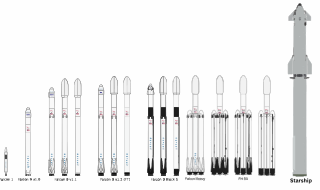| Company type | Privately held company |
|---|---|
| Industry | Aerospace |
| Founded | 2015 |
| Founder | Joe Laurienti |
| Headquarters | |
Number of employees | 270 (2023) |
| Website | https://ursamajor.com |
Ursa Major Technologies is an American aerospace company founded in 2015 and based in Berthoud, Colorado. The company produces rocket engines and sells them to space launch and hypersonics companies, and the U.S. Government.
The company makes a 5,000-pound thrust liquid oxygen and kerosene Hadley engine, named after a character in Ray Bradbury's The Veldt. [1] It also develops the Ripley engine, with 50,000 pounds of thrust, aimed at the medium-launch market. [2]
Its commercial customers include C6 Launch Systems, a Canadian small satellite launcher, and U.S. launch startup Phantom Space. [3] It also works with Generation Orbit Launch Services and with Stratolaunch. [4]
In 2017, Ursa Major raised $8 million last with participation from the Space Angels Network. [5]
In December 2021 the company closed its largest funding round to date: an $85 million Series C led by funds and accounts managed by BlackRock. [6]
In April 2023 the company had about 270 employees. [7] The company announced that it would supply the upper stage engine for Astra Space’s in-development Rocket 4. [8]
As of 2024 its Draper prototype engine demonstrated stability similar to solid fuels, along with the active throttle control and throttle range of a liquid engine. [9]
| Engine | Status | Thrust at sea level, lbf | Thrust at sea level, kN | Propellant | Technology | Reusable | Maximum gimbal angle | Intended use |
|---|---|---|---|---|---|---|---|---|
| Hadley [10] | Initial production | 5,000 | 22 | Liquid oxygen/kerosene | Oxygen-rich staged combustion | Yes | ±7° | Low Earth orbit, geostationary orbit, in-Space, hypersonics |
| Ripley [10] | In development | 50,000 | 220 | Liquid oxygen/kerosene | Oxygen-rich staged combustion | Yes | ±5° | Low Earth orbit, geostationary orbit |
| Arroway [10] | In development | 200,000 | 890 | Liquid oxygen/methane | Full flow staged combustion [11] | Yes | ±5° | Medium and heavy boost |
| Draper [10] | In development | 4,000 | 18 | Hydrogen peroxide/kerosene | Closed catalyst cycle | Yes | Hypersonics, defense |

The aerospike engine is a type of rocket engine that maintains its aerodynamic efficiency across a wide range of altitudes. It belongs to the class of altitude compensating nozzle engines. Aerospike engines were proposed for many single-stage-to-orbit (SSTO) designs. They were a contender for the Space Shuttle main engine. However, as of 2023 no such engine was in commercial production, although some large-scale aerospikes were in testing phases.

Interorbital Systems (IOS) is an American space development company based in Mojave, California. It was established in 1996 by Roderick and Randa Milliron. As of October 2023, the company is in development stage for three orbital launch vehicles: NEPTUNE, TRITON, and TRITON HEAVY.

Masten Space Systems was an aerospace manufacturer startup company in Mojave, California that was developing a line of vertical takeoff, vertical landing (VTVL) rockets, initially for uncrewed research sub-orbital spaceflights and eventually intended to support robotic orbital spaceflight launches.

SpaceX manufactures launch vehicles to operate its launch provider services and to execute its various exploration goals. SpaceX currently manufactures and operates two members of the Falcon 9 family, the Falcon 9 Block 5 medium-lift launch vehicle and the Falcon Heavy heavy-lift launch vehicle – both of which are powered by SpaceX Merlin engines and employ VTVL technologies to reuse the first stage. As of 2024, the company is also developing the fully reusable Starship launch system, which will replace Falcon 9, Falcon Heavy, and Dragon.

Stratolaunch LLC is a private American aerospace company providing high-speed flight test services. It was founded in 2011 to develop a new air-launched space transportation system, with its corporate headquarters in Seattle. The company and development project were announced in December 2011 by Microsoft co-founder Paul Allen and Scaled Composites founder Burt Rutan, who had previously collaborated on SpaceShipOne. After ten years, the company was acquired in 2019 by Cerberus Capital Management and has continued privately funded, operating as a non-traditional defense contractor.

The Scaled Composites Model 351 Stratolaunch or Roc is an aircraft built by Scaled Composites for Stratolaunch Systems to carry air-launch-to-orbit (ALTO) rockets, and subsequently repurposed to offer air launch hypersonic flight testing after a change of ownership. It was announced in December 2011, rolled out in May 2017, and flew for the first time on April 13, 2019, shortly after the death of founder Paul Allen. The aircraft features a twin-fuselage design and the longest wingspan ever flown, at 385 feet (117 m), surpassing the Hughes H-4 Hercules "Spruce Goose" flying boat of 321 feet (98 m). The Stratolaunch is intended to carry a 550,000-pound (250 t) payload and has a 1,300,000-pound (590 t) maximum takeoff weight.

Astra Space, Inc., formerly known as Ventions, LLC from 2005 - 2016, is an American space company based in Alameda, California, with facilities in Sunnyvale, California and Atwater, California. The company was initially an aerospace technology research firm that focused on SBIR contracts, developing small rocket engines for use on launch vehicles and satellite propulsion. In 2012, the company shifted to developing launch vehicles and was selected for the DARPA ALASA program, eventually leading to the development and launch of the Astra Rocket series of launch vehicle utilizing both government and private funding after reincorporating itself to Astra Space, Inc. in 2016. The company would have their first successful launch in 2021, nine years after the start of development, after 6 previous failed attempts.
Firefly Aerospace is an American private aerospace firm based in Cedar Park, Texas, that develops small and medium launch vehicles for commercial launches to orbit. The current company was formed when the assets of the former company Firefly Space Systems were acquired by EOS Launcher in March 2017, which was then renamed Firefly Aerospace. Firefly's stated purpose is to increase access to space, similar to other private spaceflight companies.
Vector Launch, Inc. is an American space technology company which aims to launch suborbital and orbital payloads. Vector Launch declared bankruptcy in December 2019 and re-emerged in October 2020.
LandSpace Technology Corporation is a Chinese commercial space launch provider based in Beijing. It was founded in 2015 by Zhang Changwu.
LinkSpace or Link Space Aerospace Technology Inc. is a Chinese private space launch company based in Beijing. It is led by CEO Hu Zhenyu, and founded as the first private rocket firm in China. The company was founded in 2014, by Hu Zhenyu, a graduate of South China University of Technology; Yan Chengyi, a graduate of Tsinghua University; and Wu Xiaofei, a manufacturing expert. The company is registered in Shenzhen.

Skyroot Aerospace Private Limited is an Indian private aerospace manufacturer and commercial launch service provider headquartered in Hyderabad, Telangana. The company was founded by former engineers and scientists from ISRO. Currently it is aiming to develop and launch its own series of small-lift launch vehicles especially crafted for the small satellite market.

BluShift Aerospace is an employee-owned American aerospace firm based in Brunswick, Maine. Targeting the growing smallsat and cubesat launch markets, bluShift is developing suborbital sounding rockets and small-lift orbital rockets which will be launched from a proposed new spaceport in Maine. The company has received primary funding from NASAs SBIR grant program, the National Science Foundations I-Corps grant program, the Maine Technology Institute, and the Maine Space Grant Consortium. The company has active operations at the former Brunswick Naval Air Station and Loring Air Force Base.

Space Pioneer, also known as Beijing Tianbing Technology Co., Ltd., is a Chinese aerospace company developing reusable orbital rocket technology—both launch vehicles and liquid rocket engines—to access the market for low-cost space launch services. The company is aiming to meet launch requirements for both the Chinese national satellite internet project and also the CNSA solicitation for resupply of the Tiangong space station.
Jiangsu Deep Blue Aerospace Technology Co., Ltd. is a private space launch enterprise founded in November 2016 by Huo Liang. The company is located in Jiangsu province on the East coast of China. It is engaged in the development of reusable rockets.
Archimedes is a liquid-fuel rocket engine burning liquid oxygen and liquid methane in an oxidizer-rich staged combustion cycle. It is designed by aerospace company Rocket Lab for its Neutron rocket.
The Ursa Major Technologies Hadley is a 22-kilonewton (5,000 lbf) thrust Kerosene/LOX oxidizer-rich staged combustion cycle rocket engine.
The YF-102 is a Chinese liquid rocket engine burning LOX and kerosene in a gas generator cycle. It is manufactured by the AALPT based on the experience of previous kerolox engines, and using 3D printing technology and is capable of multiple restarts. It is used in Tianlong-2 launch vehicle developed by Space Pioneer.

The Astra Rocket was a small-lift space launch vehicle series designed, manufactured, and operated by American company Astra. The rockets were designed to be manufactured at minimal cost, employing very simple materials and techniques. They were also designed to be launched by a very small team, and be transported from the factory to the launch pad in standard shipping containers.